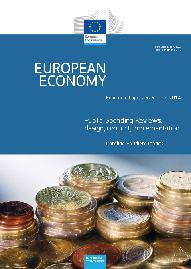Magalhães, C. P. & Ceka, B. (2014) “The meaning of democracy changes for Europeans depending on their education status, income and national context“, LSE EUROPP Blog, 27 August. Most Europeans value democracy, but do all citizens have the same conception of what democracy is? Pedro C. Magalhães and Besir Ceka assess variations in how Europeans conceive of democracy and analyse the various factors which underpin different interpretations. Their findings …Read More
How Far Away Is a Single European Labor Market?
Krause, A., Rinne, U. & Zimmermann, F. K. (2014) “How Far Away Is a Single European Labor Market?“, IZA Discussion Paper No. 8383, August. A Single European Labor Market, particularly involving the free movement of workers within Europe, has been a goal of the European community since the 1950s. Whereas it may entail opportunities and drawbacks alike, the benefits– such as greater economic welfare for most citizens– are supposed …Read More
Destabilizing a stable crisis: Employment persistence and government intervention in macroeconomics
Lima, B. C., Grasselli, M. R., Wang, X.-S. & Wu, J. (2013) “Destabilizing a stable crisis: Employment persistence and government intervention in macroeconomics“, Structural Change and Economic Dynamics, No. 30 (2014), pp. 30-51. The basic Keen model is a three-dimensional dynamical system describing the time evolution of the wage share, employment rate, and private debt in a closed economy. In the absence of government intervention this system admits, among …Read More
Financial crises: lessons from history for today
Sayek, S. & Taskin, F. (2014) “Financial crises: lessons from history for today“, Economic Policy, Vol. 29, Issue 79, pp. 447–493. Making use of the propensity score matching method, we match earlier crises (pre-2007) with currently ongoing crises (post-2007). The old and new crises are matched in three dimensions: the global setting in which they occurred, the structure of the economy and the domestic vulnerabilities in the pre-crisis period. Our …Read More
Public Spending Reviews: design, conduct, implementation
Vandierendonck, C. (2014) “Public Spending Reviews: design, conduct, implementation“, European Economy, European Commission Economic Papers, 525, July: Brussels. This paper proposes to highlight the main features and key success factors of the design, conduct and implementation of spending reviews, based on the experiences of EU Member States. Public expenditure accounts for almost half of the annual wealth created in the EU (49.0% of GDP in 2013). A major policy …Read More
What Does the 1930s’ Experience Tell Us about the Future of the Eurozone?
Crafts, N. (2014) “What Does the 1930s’ Experience Tell Us about the Future of the Eurozone?“. JCMS: Journal of Common Market Studies, 52: 713–727, Ιούλιος. If the eurozone follows the precedent of the 1930s, it will not survive. The attractions of escaping from the gold standard then were massive and they point to a strategy of devalue and default for today’s crisis countries. A fully federal Europe with a banking …Read More
Progress Towards External Adjustment in the Euro Area Periphery and the Baltics
Shik Kang, J. & Shambaugh C., J. (2014) “Progress Towards External Adjustment in the Euro Area Periphery and the Baltics“, Working Paper No.14/131, International Monetary Fund, 22 July. The euro area periphery countries and the Baltic countries, which had large current account deficits in the run-up to the crisis, needed adjustment of relative prices to achieve both internal and external balances. Thus far, tangible progress has been made through …Read More
Tax harmonisation in Europe: Moving forward
Benassy-Quéré, A. & Wolff, G. (2014) “Tax harmonisation in Europe: Moving forward“, VoxEU Organisation, 22 July. Tax harmonisation has been controversial since the establishment of the European Economic Community, and corporation tax proposals are currently on the table in the EU. Although tax competition can be beneficial, tax harmonisation could curb tax competition that leads to the under-provision of public goods or to burden-shifting from mobile to immobile tax …Read More
The European Council’s Guidelines for the Area of Freedom, Security and Justice 2020: Subverting the ‘Lisbonisation’ of Justice and Home Affairs?
Carrera, S. & Guild, E. (2014) “The European Council’s Guidelines for the Area of Freedom, Security and Justice 2020: Subverting the ‘Lisbonisation’ of Justice and Home Affairs?“, Justice and Home Affairs, CEPS Essays, 14 July. In its Conclusions of 26-27 June 2014, the European Council has adopted the new “Strategic Guidelines for Legislative and Operational Planning for the coming years within the EU’s Area of Freedom, Security and Justice …Read More
Trust and the welfare state: The twin-peaked curve
Algan, Y., Cahuc, P. & Sangnier, M. (2014) “Trust and the welfare state: The twin-peaked curve“, VoxEU Organisation, 17 July. It is commonly argued that the persistence of large welfare states in Scandinavian countries is due to the trustworthiness of their citizens. This column shows that the relationship between trust and the size of the welfare state is twin peaked. Untrustworthy individuals support generous welfare states because they expect …Read More






